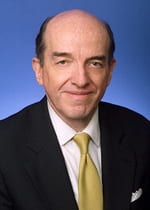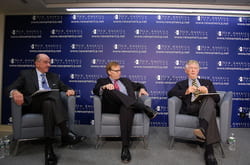 WASHINGTON — Federal Communications Commission member Michael J. Copps is calling for reinvigorated federal regulation of broadcasting to encourage more, and more serious journalism.
WASHINGTON — Federal Communications Commission member Michael J. Copps is calling for reinvigorated federal regulation of broadcasting to encourage more, and more serious journalism.
Expanding on his June 9 remarks following the release of the FCC’s staff report on the information needs of communities, Copps criticized the report’s optimism about the Internet.
“What we have gained on the Internet,” said Copps (pictured left), “does not match what we have lost” due to cutbacks in newspaper and broadcast newsrooms. And he urged new FCC regulatory initiatives to help create new and strengthened forums for journalism and debate.
“Let us recognize up front that building a new town square,” he said, “is not going to happen on autopilot.”
Commissioner Copps praised the report’s 400+ pages of factual findings, but he said the report’s recommendations were insufficient responses to the facts it uncovered.
“Too often,” he said, “the recommendations do not track with the analysis.”
 Photo courtesy of the the New America Foundation
Photo courtesy of the the New America FoundationCopps’ criticism was echoed by the forum’s other speaker, longtime ABC News correspondent Ted Koppel (right, far right).
“The report in some respects was quite whimsical in its accurate assessment of the problems, and quite a courageous assessment,” said Koppel. “But then…the conclusion of this report is that all is well.”
Commissioner Copps also criticized “the kind of infotainment that passes for national and international news.” He said he recognized the First Amendment implications of the federal government trying to decide what is serious news and what is not, but that the FCC should not shrink from the challenge of regulating the content of broadcast news.
“Advocates of media reform need not cower in the corner,” he said, because of the First Amendment.
This could raise a problem for regulators: how to define “serious news.” is it Today, Good Morning America and The Early Show offering pop music performances? All of those are produced by the network news divisions of NBC, ABC and CBS, respectively. Developing a federal litmus test for “serious” news could be a challenge.
Copps and Koppel offered their remarks at a forum on June 15 at the New America Foundation. USC presented a similar forum here in Washington on Monday, June 13.
Both speakers said that broadcast news used to be much better, and it was because news did not need to make money.
“When I joined ABC back in 1963,” said Koppel, “there was not a great deal of emphasis on money that news divisions could earn. We gave the public the news we thought it needed tn hear.”
But this raises a question from someone who was there (I began at CBS News in 1964): Was television news really better in 1963? In that year, ABC News presented only fifteen minutes of world and national news each evening, and that was preceded by just fifteen minutes of local news from the local stations (typically five minutes of local news followed by ten minutes of sports and weather). At eleven o’clock, the local news was also fifteen minutes long (again including sports and weather). So what viewers saw was, as Walter Cronkite described it, “a headline service.”
Even news budgets have increased sharply since then: At today’s forum, Koppel said he annual budget of ABC News in 1963 was “$15 or $20 million.” Even after recent cuts, networks spend much more on news today. But Koppel argued that this golden age changed in 1968.
“A new television news program [60 Minutes] arrived on the scene,” he said. “Over the course of three or four years it accomplished something that no other newscast had done.” It made money. “We had become for the first time profit centers.”
But again, from someone who was there: By 1971 or 72, when Koppel said network news became profitable, that was already old news at local stations. Years earlier, it was, well, money that drove the expansion of local news. Pioneered by KNXT (now KCBS-TV) and “The Big News,” viewers in Los Angeles could watch a full hour of local news, every night. The audience loved it, and KNXT discovered the expended news could be supported by advertisers.
The crazy experiment in L.A. led some of my colleagues at CBS in New York to fly west to see how KNXT could produce an hour of local news every night – and make money. Soon afterwards, CBS, NBC and ABC stations expanded to two or three hours of local news in early evening – and today, another two or three hours of local news in the morning.
The FCC report notes that broadcasters in smaller towns do not usually offer such extended coverage. This is true: And newspapers in smaller towns have fewer pages than the Los Angeles Times.